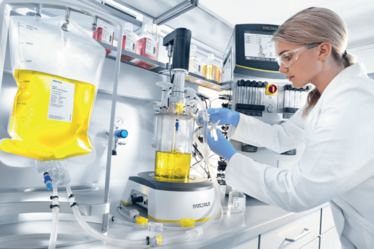
Success at Speed: Digging into Accelerated Vaccine Development
Part 7 – Progress so far. There is a promising pipeline of vaccine candidates, but what happens if the frontrunners fail?
Amélie Boulais, Piergiuseppe Nestola |
sponsored by Sartorius
So far, the progress towards a COVID-19 vaccine is, frankly, incredible. In just nine months (January–September), more than 150 vaccine candidates have entered the pipeline – 35 of which are under clinical evaluation in humans, according to the latest WHO report (1). Nine vaccines are in phase III trials and will be tested in large numbers of people (usually around 30,000), and three vaccines are already approved for limited use; two in China and one in Russia. All vaccine modalities mentioned in the previous articles in this series have made it to clinical evaluation: recombinant subunit vaccines, viral vector vaccines, viral vaccines, and mRNA and DNA vaccines. Great progress has also been made in terms of quickly scaling up manufacture, finding capacity, and forming alliances. Efficiency has been maximized in R&D, manufacturing, and clinical development to ensure a fast response.
To ensure availability of vaccines for their populations, many governments have already ordered millions of doses of the frontrunner candidate vaccines. For example, Europe has ordered 400 million doses of the AstraZeneca vaccine. The company is expecting to produce two billion doses and is partnering with companies all over the word to expand capacity. Another example is BioNtech, which has developed an mRNA vaccine and partnered with Pfizer and Fosun Pharma to ensure production and distribution. The US government has ordered 100 million doses, with an option for 500 million more, and Japan’s government has ordered 120 million doses.
Despite the need for speed, clinical development must not compromise on safety or quality – as we have reiterated in this article series. Even though the timelines for COVID-19 vaccines are compressed, clinical trials phases have not been skipped, but rather companies are trying to combine phases and maximize efficiency in data gathering and analysis. Some companies, like J&J, are also enrolling more patients than typically required (currently at around 60,000 participants) for vaccine studies to ensure safety and to develop a reliable dataset (2).
Ultimately, most companies are aiming to be either first in class or best in class with their COVID-19 vaccine; both are difficult to achieve in the highly competitive first-generation COVID-19 vaccine race.
With companies taking every precaution to ensure safety, the primary danger of acceleration is perhaps more business related than public health related. Vaccine developers stand to make significant financial losses – particularly if production has already begun – if their clinical trials fail. And that’s why the support of funding organizations is fundamental. Indeed, the large amount of funding available has facilitated the start of manufacturing or large-scale clinical trials facing business and financial risks.

There are a number of frontrunning vaccines right now, but if all are unsuccessful, the world will need to look elsewhere in the pipeline and move funding and partnerships to potential candidates at earlier stages of development.
When (or “if” for pessimists) a vaccine is successful, it will not offer 100 percent protection in a population. Right now, some pre-clinical studies suggest that, although COVID-19 vaccination of young subjects can prevent diseases of the lower respiratory tract, the virus is still present in the higher respiratory tract. And that means the virus can still circulate. Scientists also acknowledge that a vaccine may be less effective in the older population (which is already the case for flu vaccines, for example), who are more at risk of COVID-19 complications (3,4,5).
Different countries have different perceptions of the benefits and the risks. The public in most Western countries expect vaccines to protect as close to 100 percent of the population as possible, with no side effects – an incredibly high benchmark. For many years, the anti-vaccination movement has been growing in strength so it will be crucial to reassure people that a COVID-19 vaccine is safe and efficacious. In other parts of the world, where access to healthcare is more difficult, governments may accept a vaccine that, while not protecting all people, will decrease the burden on healthcare systems. Currently, the FDA bar for approving a vaccine is to have at least 50 percent efficacy, which might be already good to release the burden on the intensive care departments.
For COVID-19 vaccines, any rapid approval will likely only be for emergency use until additional safety and efficacy data are available. Ultimately, any vaccine will only see global use if it is safe and effective, and when the benefits outweigh any potential risks.
Find out more: http://ow.ly/6wpi50AFT0x
- WHO, “Draft landscape of COVID-19 candidate vaccines,” (2020). Available at bit.ly/2EnMowJ.
- The Wall Street Journal, “For Covid-19 Vaccine, J&J Plans 60,000-Subject Pivotal Trial,” (2020). Available at https://on.wsj.com/3jKGKUY.
- Nature, “What the immune response to the coronavirus says about the prospects for a vaccine,” (2020). Available at https://go.nature.com/3iHa25l.
- Science Translational Medicine, “Criticism of the Oxford Coronavirus Vaccine,” (2020). Available at https://bit.ly/3iK3a7s.
- STAT, “The world needs Covid-19 vaccines. It may also be overestimating their power,” (2020). Available at bit.ly/34IX8ii.
Head of Market Entry Strategy, Virus Based Therapeutics at Sartorius.



















